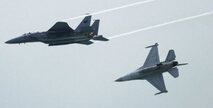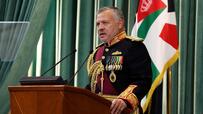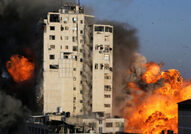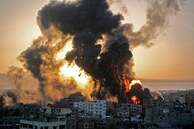2 apr 2020

The Freedom for Khudari and Palestinian Detainees in Saudi Arabia Campaign on Wednesday called for a large campaign to pressure Saudi authorities to immediately release Palestinian and Jordanian activists from their jails as the Coronavirus disease continues to spread in the country.
On 4 April 2019, Saudi authorities arrested dozens of Palestinian and Jordanian activists residing in Saudi Arabia, including Hamas representative Dr. Mohammed al-Khudari, a long time Palestinian resident of Saudi Arabia and a retired physician.
The campaign said in a statement that the arrests targeted people with various roles in the Saudi society, including doctors, journalists and businessmen, which caused shock among Arab and Muslim communities, especially that Saudi Arabia had always been known for its support and embrace of the Palestinian cause.
The campaign appealed to Saudi authorities to immediately release the detainees, on top of whom Dr. al-Khudari, saying that would be an appreciated move that "opens a new page" in the Saudi-Palestinian relations.
It also urged concerned organizations, groups and individuals to support their call and take part in social media campaigns pushing for the release of the detainees.
On 4 April 2019, Saudi authorities arrested dozens of Palestinian and Jordanian activists residing in Saudi Arabia, including Hamas representative Dr. Mohammed al-Khudari, a long time Palestinian resident of Saudi Arabia and a retired physician.
The campaign said in a statement that the arrests targeted people with various roles in the Saudi society, including doctors, journalists and businessmen, which caused shock among Arab and Muslim communities, especially that Saudi Arabia had always been known for its support and embrace of the Palestinian cause.
The campaign appealed to Saudi authorities to immediately release the detainees, on top of whom Dr. al-Khudari, saying that would be an appreciated move that "opens a new page" in the Saudi-Palestinian relations.
It also urged concerned organizations, groups and individuals to support their call and take part in social media campaigns pushing for the release of the detainees.
24 jan 2020

The Jordanian Ministry of Foreign Affairs and Expatriates strongly denounced the Friday dawn Israeli attack against Palestinian Muslim worshipers in Al-Aqsa Mosque, in occupied Jerusalem.
The Ministry said that the invasion into the courtyards of the holy sites, and the violent assault against the worshipers, is another serious Israeli violation of International Law and all related treaties.
It added that the attack is a provocative move aiming at creating more tension and called on Israel to abide by all related agreements, by ending its violations and invasions into the holy sites in occupied Palestine, especially Al-Aqsa Mosque.
The Ministry also said that, as the occupying power, Israel must respect the historic and legal statutes, and should stop these violations, instead of acting on creating more conflicts.
On Friday at dawn, the soldiers shot a young Palestinian man and a woman with rubber-coated steel bullets, and assaulted many others with clubs and batons, following dawn prayers at the Al-Aqsa Mosque, in Jerusalem.
It relayed news, the soldiers abducted, on Friday at dawn, at least thirteen Palestinians, including one woman and two journalists, from their homes in several parts of occupied East Jerusalem.
In addition, Illegal Israeli colonists, squatting on stolen Palestinian lands, burnt sections of a mosque in Sharafat Palestinian village, southwest of Jerusalem, after infiltrating into the village at dawn.
The Ministry said that the invasion into the courtyards of the holy sites, and the violent assault against the worshipers, is another serious Israeli violation of International Law and all related treaties.
It added that the attack is a provocative move aiming at creating more tension and called on Israel to abide by all related agreements, by ending its violations and invasions into the holy sites in occupied Palestine, especially Al-Aqsa Mosque.
The Ministry also said that, as the occupying power, Israel must respect the historic and legal statutes, and should stop these violations, instead of acting on creating more conflicts.
On Friday at dawn, the soldiers shot a young Palestinian man and a woman with rubber-coated steel bullets, and assaulted many others with clubs and batons, following dawn prayers at the Al-Aqsa Mosque, in Jerusalem.
It relayed news, the soldiers abducted, on Friday at dawn, at least thirteen Palestinians, including one woman and two journalists, from their homes in several parts of occupied East Jerusalem.
In addition, Illegal Israeli colonists, squatting on stolen Palestinian lands, burnt sections of a mosque in Sharafat Palestinian village, southwest of Jerusalem, after infiltrating into the village at dawn.
23 jan 2020

Jordanian Minister of Foreign Affairs Ayman Safadi warned today that Israel's annexation of the Jordan Valley in the occupied Palestinian territories would blow up the foundations of the peace process and destroy the two-state solution, ending all chances of achieving peace.
Safadi told Jordanian News Agency (Petra) that the ongoing Israeli measures to expand settlements, confiscate Palestinian land, and declare plans to annex the Palestinian part of the Jordan Valley are illegal measures that violate international law and kill hope that peace can be achieved.
Safadi warned that Israel's efforts to undermine the two-state solution through its illegal measures aimed at imposing new facts on the ground, threaten to kill all chances of achieving a lasting peace.
The minister pointed out that King Abdullah II has been spearheading intensive and continuous efforts to launch an effective international movement to resolve the conflict on the basis of a two-state solution, and to confirm the centrality of the Palestinian issue.
He maintained that Jordan will continue to work with the international community and in coordination with Arab countries to achieve peace on the foundations that guarantee its viability and acceptance by the region's peoples.
The minister also warned that “the killing of hope for peace means fueling despair, undermining moderation, allowing extremism to prevail, and pushing the region towards more conflict and violence.”
Safadi also warned of the consequences of the Israeli violations against Muslim and Christian holy sites in occupied Jerusalem.
He stressed that protecting the holy sites and addressing all Israeli attempts to attack them is a sustainable action through direct engagement with the international community and in international organizations such as the United Nations and UNESCO.
Safadi further pointed out that Jordan continues to work with the international community to support the United Nations Relief and Works Agency for Palestine Refugees (UNRWA) and ensure that it continues to carry out its duty towards Palestinian refugees as mandated by the UN.
Safadi told Jordanian News Agency (Petra) that the ongoing Israeli measures to expand settlements, confiscate Palestinian land, and declare plans to annex the Palestinian part of the Jordan Valley are illegal measures that violate international law and kill hope that peace can be achieved.
Safadi warned that Israel's efforts to undermine the two-state solution through its illegal measures aimed at imposing new facts on the ground, threaten to kill all chances of achieving a lasting peace.
The minister pointed out that King Abdullah II has been spearheading intensive and continuous efforts to launch an effective international movement to resolve the conflict on the basis of a two-state solution, and to confirm the centrality of the Palestinian issue.
He maintained that Jordan will continue to work with the international community and in coordination with Arab countries to achieve peace on the foundations that guarantee its viability and acceptance by the region's peoples.
The minister also warned that “the killing of hope for peace means fueling despair, undermining moderation, allowing extremism to prevail, and pushing the region towards more conflict and violence.”
Safadi also warned of the consequences of the Israeli violations against Muslim and Christian holy sites in occupied Jerusalem.
He stressed that protecting the holy sites and addressing all Israeli attempts to attack them is a sustainable action through direct engagement with the international community and in international organizations such as the United Nations and UNESCO.
Safadi further pointed out that Jordan continues to work with the international community to support the United Nations Relief and Works Agency for Palestine Refugees (UNRWA) and ensure that it continues to carry out its duty towards Palestinian refugees as mandated by the UN.
19 jan 2020

The motion was passed unanimously by Jordan's 130 lawmakers following weekend protests around the country against the new energy deal between the two countries
Jordan's parliament on Sunday approved a draft law to ban imports of Israeli gas to the country just days after they started under a multibillion-dollar deal struck in 2016 which is opposed by much of the population.
The motion was passed unanimously by Jordan's 130 lawmakers and will be referred to the cabinet to be made law, although legal hurdles may prevent it coming into force.
The government has previously said it was a deal between companies rather than a political matter.
The $10 billion supply deal was originally struck between Jordan's state-owned utility and a U.S. Israeli consortium led by Texas-based Noble Energy, to provide gas to the country's power plants for electricity generation.
It was not referred to parliament for approval.
Although U.S. ally Jordan has a peace treaty with Israel the deal, which supplies Jordan for 15 years, has faced much popular opposition, with lawmakers arguing it makes the kingdom dependent on its neighbor for energy.
Many Jordanians are also the descendants of Palestinians who moved to the country after the creation of Israel in 1948 and view Israel as an erstwhile enemy that expelled their ancestors from their homes.
The Jordanian government said after the agreement was signed in 2016 that securing stable energy prices for the next decade could achieve annual savings of at least $500 million and help reduce a chronic budget deficit.
The import of Israeli gas has become a major focus in Jordan and sparked protests and calls for both the deal and the peace treaty to be scrapped.
"The gas of the enemy is an occupation. Down with the gas deal," placards carried by protesters said.
Jordan's ties with Israel have come under increasing strain since the gas deal was struck as Israel has moved to the right and since Donald Trump replaced Barack Obama as U.S. president.
Jordan's King Abdullah fears Israel's rejection of a Palestinian state in the occupied West Bank could spark renewed violence and see a new generation of Palestinians relocating to Jordan.
Jordan's parliament on Sunday approved a draft law to ban imports of Israeli gas to the country just days after they started under a multibillion-dollar deal struck in 2016 which is opposed by much of the population.
The motion was passed unanimously by Jordan's 130 lawmakers and will be referred to the cabinet to be made law, although legal hurdles may prevent it coming into force.
The government has previously said it was a deal between companies rather than a political matter.
The $10 billion supply deal was originally struck between Jordan's state-owned utility and a U.S. Israeli consortium led by Texas-based Noble Energy, to provide gas to the country's power plants for electricity generation.
It was not referred to parliament for approval.
Although U.S. ally Jordan has a peace treaty with Israel the deal, which supplies Jordan for 15 years, has faced much popular opposition, with lawmakers arguing it makes the kingdom dependent on its neighbor for energy.
Many Jordanians are also the descendants of Palestinians who moved to the country after the creation of Israel in 1948 and view Israel as an erstwhile enemy that expelled their ancestors from their homes.
The Jordanian government said after the agreement was signed in 2016 that securing stable energy prices for the next decade could achieve annual savings of at least $500 million and help reduce a chronic budget deficit.
The import of Israeli gas has become a major focus in Jordan and sparked protests and calls for both the deal and the peace treaty to be scrapped.
"The gas of the enemy is an occupation. Down with the gas deal," placards carried by protesters said.
Jordan's ties with Israel have come under increasing strain since the gas deal was struck as Israel has moved to the right and since Donald Trump replaced Barack Obama as U.S. president.
Jordan's King Abdullah fears Israel's rejection of a Palestinian state in the occupied West Bank could spark renewed violence and see a new generation of Palestinians relocating to Jordan.
15 jan 2020

The Jerusalem District Electricity Company (JDECO) and the Jordanian National Electricity Company signed today in the Jordanian capital, Amman, an agreement to raise Palestine’s electricity supply capacity by bolstering the electrical connection between them that would allow an increase in the quantity of current exported to Palestine from 26 MW to 80 MW.
The agreement was signed in the presence of the Jordanian Minister of Energy and Mineral Resources, Hala Zawati, the head of the Palestinian Energy and Natural Resources Authority, Thafer Melhem, the director general of the National Electricity Company, Amjad al-Rawashda, and the director general of JDECO, Hisham Omari.
Melhem told WAFA that there were many reasons that prompted the Palestinians to rely on the Arab countries to diversify Palestinian energy sources. He said that this project will raise the capacity of the electrical system in Palestine to 80 megawatts, expecting to complete the project within seven months.
Zawati stressed the importance of this step in strengthening cooperation between Jordan and Palestine, and within the framework of Jordan's aspiration to have electricity exchange for commercial reasons with neighboring Arab countries in a way that enhances the stability of the Jordanian electrical system and serves the aspiration for a common Arab market.
Rawashda said the agreement constitutes the second stage of the joint linkage between the two countries, stressing the importance of the project in achieving additional revenues for the National Electricity Company.
The Palestinians have been looking at neighboring Arab countries to diversify their energy resources in order to end their full reliance on Israel, which often uses this dependency to extort the Palestinians.
The agreement was signed in the presence of the Jordanian Minister of Energy and Mineral Resources, Hala Zawati, the head of the Palestinian Energy and Natural Resources Authority, Thafer Melhem, the director general of the National Electricity Company, Amjad al-Rawashda, and the director general of JDECO, Hisham Omari.
Melhem told WAFA that there were many reasons that prompted the Palestinians to rely on the Arab countries to diversify Palestinian energy sources. He said that this project will raise the capacity of the electrical system in Palestine to 80 megawatts, expecting to complete the project within seven months.
Zawati stressed the importance of this step in strengthening cooperation between Jordan and Palestine, and within the framework of Jordan's aspiration to have electricity exchange for commercial reasons with neighboring Arab countries in a way that enhances the stability of the Jordanian electrical system and serves the aspiration for a common Arab market.
Rawashda said the agreement constitutes the second stage of the joint linkage between the two countries, stressing the importance of the project in achieving additional revenues for the National Electricity Company.
The Palestinians have been looking at neighboring Arab countries to diversify their energy resources in order to end their full reliance on Israel, which often uses this dependency to extort the Palestinians.
9 jan 2020

The Jordanian government denounced, Wednesday, the Israeli decision to build additional 1936 units in its illegal colonies in the occupied West Bank.
Ambassador Daifallah al-Fayez, the spokesperson of the Jordanian Ministry of Foreign Affairs and Expatriates, said that all of Israel’s colonies are illegal as they also constitute a serious breach of International Law and International Humanitarian Law.
Al-Fayez added that the International Community must act and uphold its responsibilities to stop Israel’s illegal policies, especially the construction and expansion of its colonies.
He also said that these violations are placing more obstacles to the efforts to achieve a comprehensive, just and lasting peace, and called on obliging Israel to implement all related international legitimacy resolutions, including UN Security Council resolution #2334.
Ambassador Daifallah al-Fayez, the spokesperson of the Jordanian Ministry of Foreign Affairs and Expatriates, said that all of Israel’s colonies are illegal as they also constitute a serious breach of International Law and International Humanitarian Law.
Al-Fayez added that the International Community must act and uphold its responsibilities to stop Israel’s illegal policies, especially the construction and expansion of its colonies.
He also said that these violations are placing more obstacles to the efforts to achieve a comprehensive, just and lasting peace, and called on obliging Israel to implement all related international legitimacy resolutions, including UN Security Council resolution #2334.
8 jan 2020

The Palestinian News and Info Agency reported that Jordan’s Ministry of Foreign Affairs and Expatriates condemned, on Tuesday evening, the Israeli police attacks on Muslim worshipers inside the sacred Al-Aqsa mosque compound, Islam’s third holiest site.
The ministry’s spokesperson, Ambassador Daifallah al-Fayez, rejected and condemned, in a statement, the Israeli attack on worshipers, considering it a violation of Israel’s commitments as the occupying power based on international law.
He called on the Israeli authorities to respect the sanctity of the mosque and the freedom and safety of worshipers.
The minister also denounced the Israeli authorities’ erection of wooden poles and metal structures at the southern wall of the mosque, which he stressed is an integral part of the mosque, calling on the Israeli authorities to immediately remove them.
He said that the Islamic Jerusalem Waqf is the sole institution responsible for administrating the affairs of al-Aqsa Mosque, including maintenance of the inside and outside walls of the mosque.
The minister warned of the consequences of continuing Israeli violations against the mosque and worshipers, calling on the Israeli authorities to stop such violations and to respect the historical and legal status quo of the al-Aqsa mosque.
The ministry’s spokesperson, Ambassador Daifallah al-Fayez, rejected and condemned, in a statement, the Israeli attack on worshipers, considering it a violation of Israel’s commitments as the occupying power based on international law.
He called on the Israeli authorities to respect the sanctity of the mosque and the freedom and safety of worshipers.
The minister also denounced the Israeli authorities’ erection of wooden poles and metal structures at the southern wall of the mosque, which he stressed is an integral part of the mosque, calling on the Israeli authorities to immediately remove them.
He said that the Islamic Jerusalem Waqf is the sole institution responsible for administrating the affairs of al-Aqsa Mosque, including maintenance of the inside and outside walls of the mosque.
The minister warned of the consequences of continuing Israeli violations against the mosque and worshipers, calling on the Israeli authorities to stop such violations and to respect the historical and legal status quo of the al-Aqsa mosque.
Page: 2 - 1
